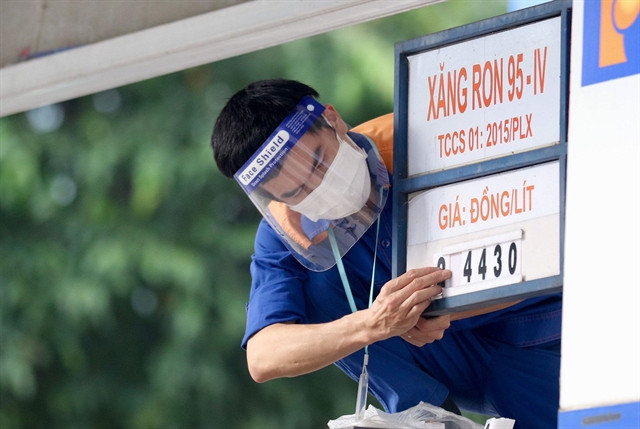 Rising oil and food prices are putting pressure on Việt Nam's inflation this year. (Photo: thanhnien.vn)
Rising oil and food prices are putting pressure on Việt Nam's inflation this year. (Photo: thanhnien.vn)According to Oxford Reference, imported inflation is inflation due to increasesin the prices of imports, which increases domestic costs of production andleads to rising prices of domestically produced goods.
Signs of imported inflation arose from the beginning of this year with the pricesof imported fuels, materials and components increasing significantly, makingimports grow faster than exports.
Updates from the General Statistics Office showed that Vietnam’s import valuerose by 15.9 percent in the first two months of this year, compared to thegrowth rate of 10 percent of export value. The country switched from a tradesurplus of 1.4 billion USD in January to a trade deficit of 2.34 billion USD inFebruary.
In January-February, Vietnam posted a trade deficit of 937 million USD,compared to a trade surplus of 1.6 billion USD in the same period last year.
The increase in import value was due to the increases in prices of importsrather than in import volume. The import volume of some products even saw dropssuch as metals, cashew, coal and gas.
Economic expert Vu Dinh Anh said that the Russia-Ukraine conflict did not havea significant direct impact on Vietnamese trade but wasindirectly affecting trade with many foreign partners. Vietnam’strade with Russia and Ukraine accounted for just 1.06 percent and 0.1 percent,respectively, of the country’s total trade revenue.
However, the tensions together with sanctions from the US and EU on Russia wereheavily affecting fuel, material and food prices, creating inflation pressureon Vietnam.
Crude oil and food prices already increased sharply in 2021 and continued toskyrocket in the first months of this year.
According to the Food and Agriculture Organisation of the United Nations, thebenchmark gauge for world food prices FAO Food Price Index which tracks monthlychanges in the international prices of commonly-traded food commodities went upin February, reaching an all-time high, led by vegetable oils and dairyproducts.
Reuters reported that oil prices soared to their highest level since 2008 dueto delays in the potential return of Iranian crude to global markets and as theUS and European allies consider banning imports of Russian oil. Brent rose 11.67USD, or 9.9 percent, to 129.78 USD a barrel by 6:50pm EST (23:50 GMT),while U.S. West Texas Intermediate (WTI) crude rose 10.83 USD, or 9.4 percentto 126.51 USD, putting both contracts on track for their highest dailypercentage gains since May 2020.
Imported inflation did not happen in 2021 thanks to the Government’s effectivemacro-economic policies but has arisen as a risk this year. “Controllingimported inflation is a considerable source of pressure for Vietnam at thismoment,” Anh said.
Anh said that while the development of the Russia-Ukraineconflict remained uncertain, it was essential to pay attention topromoting exports and putting imports under control.
Former Deputy Director of the Vietnam Industry and Trade Information Centre LeQuoc Phuong said that the abundant supply of goods coupled with the stablemacro foundation would create room for controlling inflation but the loosenedmonetary and fiscal policies to promote economic recovery and increasingdomestic demand might negatively affect inflation.
Phuong said that the VND/USD exchange rate might increase by around 1-2 percentthis year, which would contribute to pushing up prices of imports.
Experts said it was essential for Vietnam to focus on enhancing productcompetitiveness and increase added value to promote exports while usingmore domestically-produced products to reduce imports, especially productswhich saw strong increases in import prices such as fertilisers and rubber.
The State Bank of Vietnam should maintain a stable exchange rate policy,experts urged, adding that any adjustment in the exchange rate should becarefully considered to encourage exports and limit imports.
Dragon Capital, based on JP Morgan’s three scenarios for oil prices,forecast that Vietnam’s inflation would increase by 3.58 percent in case theaverage oil price was at 88 USD per barrel, 3.8 percent if the oil price was at100 USD and 4.18 percent if the oil price was at 105 USD.
However, Dragon Capital noted that the impact of rising oil prices might notaffect inflation as expected. Domestic fuel prices were affected by globalprices but they did not always move in the same direction.
Vietnam’s fuel price also included many different taxes and was considered afactor to stabilise the market. To control inflation, the Government could makesome policy adjustments, such as reducing the environmental tax on petrol.Taxes and fees currently accounted for 42 percent of petrol and oil prices.
Dragon Capital was also concerned about increases in prices of pork, riceand poultry./.




























